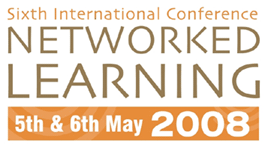

Expanding the concept of Networked Learning
Mike Johnson
Cardiff School of Nursing and Midwifery Studies, Cardiff University, johnsonmr@cf.ac.uk
Abstract
In this paper I want to explore the concept of networked learning in a way that has too rarely been attempted in the history of the conference or, indeed, the term. It struck me while preparing another publication, early in 2007, that the Networked Learning conference feels like 'just another e-learning conference'. This was partly a reflection from attendance at the 2004 and 2006 conferences. I also went back and checked this with proceedings of all past Networked Learning conferences.
Some of the key networked learning conference protagonists were involved in developing a definition of networked learning:
Learning in which information and communications technology (ICT) is used to promote connections: between one learner and other learners, between learners and tutors; between a learning community and its learning resources.
Although the core of networked learning may be represented 'in
amongst' the proceedings, there is a sense that papers are being
included so long as they have something to do with learning technology:
there may not have been a single conference without them.
I think this needs to be highlighted and addressed since it misses out
on an important contribution that networked learning could make to learning
theory and practice, not least with the rise of social networking applications.
Research into learning technology has been criticised as too small scale,
or even just inept for a number of reasons. One of these is the failure
to build upon established theory and research which is an inexcusable
failure to learn from the past. Searching the jiscmail archive for 'Networked
Learning' indicates that the membership has not used jiscmail to
discuss the concept. There was a brief exchange in October 2000, spawned
by Chris Jones, asking, 'What exactly is e-learning and does it
differ from the networked learning adressed by this list?' (sic).
Peter Goodyear's reply predicted that if we conflate eLearning as:
all that CAL/CAI/CBT stuff we've been doing for years plus what we can do now on the Web' then the whole field will actually move back rather than forward (just as it did with the introduction of the PC in the early 80's, he said, contentiously).
Learning technology research and practice is in need of suitable theoretical foundations and, with reference to Chris Jones' work, questions around the concept of networks may provide a way forward. In this paper I present two sorts of propositions that seek to extend the 2001 definition of networked learning: one that narrows the concept and another that broadens it.
The best way I can present the first proposition is in the form of a question: What does it mean to be ''networked learned'? Reading the term in this, albeit clumsy, way allows us to consider networked learning as a theory of learning, although I have tried to subsume it within the context of work by Goodyear around 'epistemic fluency'.
For the second proposition I turn to work from my recent Masters in Advanced
Learning Technology. In the Final Project Report (dissertation) I argued
that the UK's Joint Information Systems Committee report on 'Effective
networked learning in higher education: notes and guidelines', as with
other such documents, presume student engagement or dismiss non-engagement
as something that will be resolved over time; engagement which was the
lifeblood of networked learning opportunities. I proposed a widening of
the definition of networked learning with special reference to the meaning
of 'promoting connections'. For successful episodes of networked
learning, a designer's attention must be given to 'promoting
connections' of technology use in the minds and lives of all involved.
| About NLC |
2008 Conference Papers
| Conference Committee| Keynote
Speakers
| Papers from previous NL conferences |Research Seminars| Current Conference
| Sponsors | Contact
|
